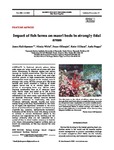Impact of fish farms on maerl beds in strongly tidal areas
| dc.contributor.author | Hall-Spencer, Jason | |
| dc.contributor.author | White, N | |
| dc.contributor.author | Gillespie, E | |
| dc.contributor.author | Gillham, K | |
| dc.contributor.author | Foggo, Andrew | |
| dc.date.accessioned | 2013-02-20T11:23:50Z | |
| dc.date.available | 2013-02-20T11:23:50Z | |
| dc.date.issued | 2006-01-01 | |
| dc.identifier.issn | 0171-8630 | |
| dc.identifier.issn | 1616-1599 | |
| dc.identifier.uri | http://hdl.handle.net/10026.1/1351 | |
| dc.description.abstract |
In Scotland, Atlantic salmon Salmo salar cages are being moved out of areas with slow water movements, to disperse wastes and reduce impacts on benthic communities. This first study of the effects of fish farms on maerl beds (red algal coralline gravels of high conservation importance) demonstrated major impacts on the benthos, even in strongly tidal areas. SCUBA surveys of 3 fish farms located over maerl revealed a build-up of waste organic matter and 10 to 100-fold higher abundances of scavenging fauna (e.g. Necora puber, Pagurus bernhardus) than on 6 reference maerl beds. Visible waste was noted up to 100 m from cage edges, and all 3 farms caused significant reductions in live maerl cover, upon which this habitat depends. Near-cage infaunal samples showed significant reductions in biodiversity, with small Crustacea (ostracods, isopods, tanaids and cumaceans) being particularly impoverished in the vicinity of cages, and significant increases in the abundance of species tolerant of organic enrichment (e.g. Capitella spp. complex, Ophryotrocha hartmanni). Relocation of fish farms to areas with strong currents is unlikely to prevent detrimental effects to the structure and organisation of the benthos, and 'fallowing' (whereby sites are left unstocked for a period of time to allow benthic recovery) is inadvisable where slow-growing biogenic habitats such as maerl are concerned, as this may expand the area impacted. © Inter-Research 2006. | |
| dc.format.extent | 1-9 | |
| dc.language | en | |
| dc.language.iso | en | |
| dc.publisher | Inter-Research Science Center | |
| dc.subject | salmon farming | |
| dc.subject | maerl | |
| dc.subject | organic enrichment | |
| dc.subject | benthos | |
| dc.subject | Scotland | |
| dc.title | Impact of fish farms on maerl beds in strongly tidal areas | |
| dc.type | journal-article | |
| dc.type | Journal Article | |
| plymouth.author-url | https://www.webofscience.com/api/gateway?GWVersion=2&SrcApp=PARTNER_APP&SrcAuth=LinksAMR&KeyUT=WOS:000243104300001&DestLinkType=FullRecord&DestApp=ALL_WOS&UsrCustomerID=11bb513d99f797142bcfeffcc58ea008 | |
| plymouth.volume | 326 | |
| plymouth.publication-status | Published | |
| plymouth.journal | Marine Ecology-Progress Series | |
| dc.identifier.doi | 10.3354/meps326001 | |
| plymouth.organisational-group | /Plymouth | |
| plymouth.organisational-group | /Plymouth/Faculty of Science and Engineering | |
| plymouth.organisational-group | /Plymouth/Faculty of Science and Engineering/School of Biological and Marine Sciences | |
| plymouth.organisational-group | /Plymouth/PRIMaRE Publications | |
| plymouth.organisational-group | /Plymouth/REF 2021 Researchers by UoA | |
| plymouth.organisational-group | /Plymouth/REF 2021 Researchers by UoA/UoA07 Earth Systems and Environmental Sciences | |
| plymouth.organisational-group | /Plymouth/Research Groups | |
| plymouth.organisational-group | /Plymouth/Research Groups/Marine Institute | |
| plymouth.organisational-group | /Plymouth/Users by role | |
| plymouth.organisational-group | /Plymouth/Users by role/Academics | |
| dc.identifier.eissn | 1616-1599 | |
| dc.rights.embargoperiod | Not known | |
| rioxxterms.versionofrecord | 10.3354/meps326001 | |
| rioxxterms.licenseref.uri | http://www.rioxx.net/licenses/all-rights-reserved | |
| rioxxterms.type | Journal Article/Review |


